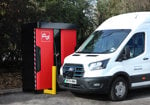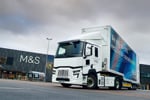The train

TAKING the train was a revelation. Although a return ticket can cost £80 to Edinburgh, I picked one up for just £25 by booking in advance through www.thetrainline.com.
Discounted tickets were also available through the train operator GNER www.gner.co.uk.
For my evening journey, I left work at 5.50pm, drove to Peterborough train station, parked and collected my tickets from a machine, before boarding the 6.16pm train. I faced a four-hour journey, but with my laptop I was happy to work and also enjoyed a glass of wine and some food.
There were no delays and because the train was quite empty I changed seats, as the one I had booked was next to the carriage door and the toilet. If I hadn’t been able to move, it might have been a less relaxed journey.
Once I arrived in Edinburgh on time at 10.16pm – having completed all the work I had wanted to do with plenty of time to spare – it was a short walk to my hotel. After my meeting the next morning, I walked to Edinburgh Waverley station and caught the 4pm train, which got me back to Peterborough for 7.38pm.
The total cost was less than the cost of petrol (and depreciation) for driving to Edinburgh and back, and much more productive as I completed a large amount of work on both legs of the journey.
John Maslen, Editor-in-Chief, Fleet News Europe
By train – Peterborough to Edinburgh
Time taken:
Journey 3hrs 45mins
Drive to station 30mins
Total 4hrs 15mins
Cost:
Cheapest train ticket £25
Parking at station car park £5.50
(Alternative parking nearby from £10 to £15 per day)
Total £30.50
Trains run every 30 to 60 minutes. Standard return quoted at £89.40, but it is always cheaper to buy two singles which start at £12 each way depending on the time chosen. You could travel first class for £75.
The plane

IF the travelling time by car is more than three hours, our company policy is to fly or take the train. Both options allow work to be done if the traveller wishes.
It’s a safety issue as much as anything else. If a driver has a 9am meeting, they would have to leave home in the early hours. This is not conducive to safe driving or to having a productive working day.
I prefer flying because, although the entire journey can take as long as by train or car, it is broken up into stages which makes it less tedious.
The advent of cheap airlines also means that by booking in advance a plane ticket can be cheaper than train fares or the real cost of travelling by car. There’s also lots of choice when it comes to finding something to eat or drink.
Sally Weeks, Procurement and facilities manager, Maxxium UK
By air – Peterborough to Edinburgh
Time taken:
Easyjet flight from Stansted: 1hr
Check-in 40 mins
Drive to airport 90 mins
Total: 3hrs 10mins
Cost:
Flight ticket £129.98
Mid-stay car park £12.50
10 litres diesel £9.70
Total: £152.18
There is an express bus service between the airport and Edinburgh city centre, costing £5 return. Chauffeur service: £42.90, taxi: £25.50 one-way.
The car

THE car is easily the default choice of transport for my frequent visits to Edinburgh and it’s hardly surprising, given the drawbacks of rail and air travel.
It gives me the flexibility to plan and control my day, and not be at the mercy of inflexible train and flight timetables.
Besides, I would still have to rely on my car for the 40-minute drive to the nearest station or nearly two hours to the nearest airport.
It compares highly favourably with the fare demanded for the privilege of first-class rail travel and, looking at air travel, cuts out the hassle of parking the car, the link to the terminal and checking-in.
The car is my territory: I decide who sits next to me
and what music I listen to.
Tony Toma, art editor, Emap Contract Publishing
By car – Peterborough to Edinburgh
Model: Ford Focus
Distance: 320 miles each way
Time taken:
7hrs (6hrs, plus two 15 minute stops and one half-hour stop for lunch)
Cost:
Fuel used: 84 litres of diesel for return journey
Total: £87.30, plus depreciation
The bottom line – consider all the options
On these figures alone, you’d be mad to travel any other way than by train, but the costs for both train and air travel vary immensely depending on offers available at time of booking.
From a fleet point of view, it would be crucial to know whether a driver is travelling in a company car or using his own vehicle, which with mileage costs of around 40p a mile would hike the cost way above any other method.
There are obviously also always other factors, including time constraints, to be taken into consideration. What this comparative exercise does stress, however, is that it is always worth considering alternatives to the car.















Login to comment
Comments
No comments have been made yet.